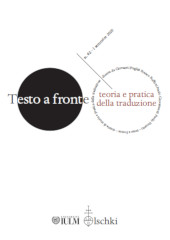Testo a fronte : teoria e pratica della traduzione
Fondata nel 1989, Testo a fronte ha sempre avuto l'obiettivo di praticare e diffondere in Italia i princìpi della traduttologia, e insieme di coniugare l'idea di poesia con l'idea di traduzione. La convinzione è che la traduzione letteraria, e di poesia in particolare, prima che un esercizio formale sia un'esperienza esistenziale intesa a rivivere l'atto creativo che ha ispirato l'originale. Ciò non significa ignorare l'immenso patrimonio scientifico che decenni di speculazione in ambito formalista, strutturalista e semiotico sono in grado di fornirci. Ma fondamentale torna a essere la possibilità di riflettere su tematiche di ordine traduttivo nell'ottica della filosofia estetica. Oggi, Testo a fronte continua a porsi al centro del dibattito fra i due àmbiti, nella convinzione che non possa esistere teoria senza esperienza storica; accettando quindi gli assiomi della linguistica teorica, ma soltanto se in rapporto dialettico con le teorie generali della letteratura e dell'ermeneutica filosofica.
Fondamentale è il riconoscimento di dignità artistica per il testo tradotto, in virtù del quale viene anche valorizzato il momento della ricezione, vale a dire della risonanza culturale che una traduzione - in quanto testo autonomo - sortisce sul pubblico. Testo a fronte si propone inoltre di riflettere sulla traduzione in un'ottica non solo letteraria ma anche intersemiotica e intermediale, prendendo dunque in esame i modi in cui si realizza il passaggio di contenuti fra media diversi, insieme alle declinazioni in senso lato transmediali di generi e modi narrativi, poetici e saggistici. Ogni numero, oltre a una serie di saggi, ospita un quaderno di traduzioni, in cui sono presentati e tradotti testi sia editi sia inediti di poeti e prosatori. La sezione di recensioni posta in chiusura di volume dà conto delle pubblicazioni più recenti in àmbito anzitutto traduttologico. [Testo dell'editore]
Founded in 1989, Testo a fronte has always pursued the promotion and application of the principles of translation theory in Italy, while at the same time synthesizing a unified concept of poetry and translation. Our conviction is that literary translation - and poetry translation in particular - is not only a formal exercise, but an existential experience aimed at reliving the creative act that inspired the original. This does not mean ignoring the immense scientific heritage that decades of research in the formalist, structuralist and semiotic fields are able to provide us with. But in our view, reflecting on translation issues from the perspective of aesthetic philosophy is also fundamental.
Today, Testo a fronte continues to be in the forefront of the debate concerning these two areas, in the conviction that there can be no theory without historical experience - that is to say, accepting the axioms of theoretical linguistics in a dialectical relationship with the general theories of literature and philosophical hermeneutics. Another essential aspect concerns the recognition of artistic dignity for the translated text, which requires taking into account the reception of the translated text - that is, the cultural impact that a translation, as an autonomous text, has on its audience. Moreover, Testo a fronte intends to reflect on translation not only from a literary point of view, but also from an intersemiotic and transmedia perspective, examining the ways in which contents are transferred across different media, together with the transmedial declination of narrative, poetic and essayistic genres and modes.
In addition to a series of essays, each issue contains a collection of translations consisting of published and unpublished texts by poets and writers presented alongside their translations. The section of reviews at the end of the volume provides an overview of the most recent publications in the field of translation studies. [Publisher's text]
-
Fascículos de la misma revista (disponibles individualmente)
-
Información
ISSN: 2785-5600
PERIODICIDAD
Semestrale = Six-monthly
CLASIFICACIÓN ANVUR
ANVUR: Area 10, Fascia S


